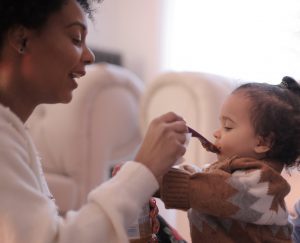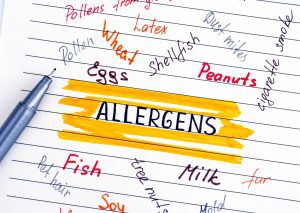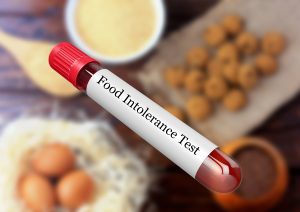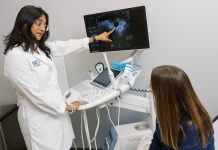Life with food allergies is something I’ve dealt with since early childhood. Growing up, I had adverse reactions whenever exposed to my allergens but never knew how to put it into words for my parents. I did not get formally diagnosed with food allergies until high school.
When I was pregnant with Luna, one of my fears was that she would have food allergies. I was paranoid and monitored everything. But, I knew this was no way to live. So I talked through my concerns with her pediatrician.
Before introducing high allergen prone foods, she recommended that we take Luna to an allergist for a full allergy panel reading. This recommendation is based on the fact that I have food allergies. Food allergies are typically genetic.
Around six-and-a-half months, I took Luna for allergy testing. Thank God she wasn’t diagnosed with any allergies. I was able to introduce foods to her without any anxiety about her having an allergic reaction.

This experience showed me the importance of early allergen detection in children. If one or both parents have food allergies, it is recommended that children receive allergy testing before introducing foods at six months, especially if one parent has anaphylaxis or life-threatening reactions!
Before exposing your children to any allergy-prone foods, I encourage you to test if your child has allergies. Imagine what it would be like for a child to have an allergic reaction to foods and not have the ability to tell you!
Fast forward three years, and this was my reality! Lyon has anaphylactic food allergies. His allergies were detected at four months. His case was a little different because the reactions were triggered via breastmilk. So when I ate his allergen prone foods, he had reactions. It was easy for me to pinpoint them from experience with breastfeeding my other children and knowing the signs from having food allergies myself.

For those of you who don’t know some of the signs of allergic reactions, here are a few:
- Itching
- Swollen eyes, lips, or throat
- Dry Skin
- Trouble Breathing
- Extreme Salivating
- Shortness of Breath
Because of Lyon’s young age, he got a blood test, which confirmed all of his allergies. I wasn’t giving up breastfeeding, so I changed my diet to accommodate his needs!
This process was scary and a bit frustrating. Food allergies look and manifest entirely differently in children than they do in adults.
If you are concerned that your child may have food allergies and would like to research some of the testing options before choosing which one is best, here are a few safe alternatives:
Try Foods in Pediatrician’s Office
This option was presented to us when my concerns initially arose about the kids having food allergies. You can bring your baby food to the pediatrician’s office and feed them right in the office. The pediatrician can monitor your child for any visible signs of an allergic reaction.
Blood Test
Blood testing is a more invasive option. The blood test is done at the pediatrician’s office. This test is a blood draw, and results can take up to 3-5 days, depending on the office.
Skin Test
An allergist or pediatrician will drop a liquid extract of an allergen directly onto the skin. The results are immediate. This test is very uncomfortable because you are directly exposed to your allergens. This was the option we chose for Luna.
Choosing to Expose Children to Allergy Prone Foods
Deciding to introduce kids to allergy-prone foods is an option. I don’t know what this option necessarily looks like. But, it was recommended by my child’s pediatrician. So I thought I would share it with any families looking to do more research.
While none of these methods are desirable, I feel they are necessary steps to take for the sake of your child. I wish my parents had more knowledge of food allergies when I was growing up. It would have saved them from so many hospital visits and kept me from the traumatic experience of allergic reactions!
In Brief
If you are a parent living with food allergies, please consider getting your children tested before introducing foods. I’ve been on both sides of the spectrum: having a child with allergies and one with a ton of food allergies. I’ve learned it’s all about perspective and the actions you are willing to take. The earlier you find out, the more time you have to affirm decisions for your child’s health. This year has taught us all that most things are out of our control. But what we do have control over, own that! Step up and advocate for your children!










